Introduction

Why to buy it?
- Tractable engine
- Comfortable ergonomics
- Composed ride quality
Why to avoid it?
- Dual-channel ABS not available across variants
- Only top-end model gets Bluetooth
This is the new TVS Ronin and it's not the Zeppelin concept-based cruiser netizens were anticipating and relentlessly asking about over the last four years. Instead, it's the brand's first-ever neo-retro scrambler which, in terms of displacement and pricing, sits between the Apache RTR 200 4V and the flagship Apache RR 310.
TVS says this can become your do-it-all motorcycle, be it city riding, highway touring, or trail riding. Sounds inviting, doesn't it? However, the claims had to be verified and TVS invited us to Goa for the same where we spent a brief amount of time with the new Ronin, in the pouring rain.
The Visuals

TVS is touting the Ronin as an uncategorised or a never-seen-before sort of motorcycle. However, visually, it is clearly inclined towards a scrambler, and the design seems to be inspired by multiple motorcycles of this breed. Nevertheless, it looks handsome and appealing in flesh. It actually boasts a good mix of old-school and contemporary aesthetics. The fat 14-litre fuel tank, chunky upside-down forks, and block-pattern tyres lend it a muscular stance while the T-shaped DRL nestling in the circular headlamp and a thin tail lamp squashed between the seat and rear fender give it that unique look.

The Ronin comes in three variants, and all the above-mentioned details hold particularly true for the top-end version which gets a dual-tone colour scheme and golden forks. Although the middle variant also gets the latter, it looks more subtle with a single-tone paint scheme. The base trim, on the other hand, has the most understated looks with a single-tone colour sans the golden forks.
In terms of the overall build quality and fit and finish, the Ronin scores high and doesn’t leave room for complaints. The paint finish looks upmarket, the plastic panels feel sturdy, the switches are tactile to operate, and there are no uneven panel gaps to be found.
The Package

The Ronin is a typical TVS in terms of equipment as there’s plenty on offer. Starting with features, it packs full-LED lighting, a silent starter, glide-through technology, a hazard switch, an assist and slipper clutch, two modes of ABS, and a fully-digital instrument cluster which is loaded with data. While these bits are common across variants, exclusive to the top-end trim are adjustable clutch and brake levers, dual-channel ABS (others get single-channel), and Bluetooth connectivity for smartphone pairing. Once paired with a phone, the console delivers navigation updates, complete ride analysis, call and SMS alerts, and voice-assisted functions.

Moving on to the hardware, the most noticeable element here is the 41mm Showa upside-down forks, unlike the traditional telescopic units on the Apache RTR 200 4V. At the rear, it’s sprung by a gas-charged monoshock which gets seven-step preload adjustability. Underpinning the bike is a double-cradle frame which rides on 17-inch alloy wheels that are shod with TVS Remora tyres, specifically designed for the Ronin. These tyres are brought to a halt by a 300mm disc up front and a 240mm rotor at the back.

Powering the Ronin is a 225.9cc, single-cylinder, four-valve, oil-cooled engine that churns out 20bhp and 19.93Nm of peak torque. Now, this engine is a derivative of the Apache 200’s mill with a few internal changes, like a longer stroke and different tuning. The performance numbers are not extraordinary but they tell you just half of the story. Mind you, all the torque comes in as early as 3,750rpm, translating into a strong low and mid-range pull, thereby delivering better tractability. Meanwhile, the transmission duties are handled by a five-speed gearbox.
The Ride

The Ronin is welcoming right from the moment you swing your leg over the bike. The low seat height of 795mm makes it effortless to hop on, and flat-footing is extremely easy for someone as tall as me at 5’11’’. Considering the bent in my knees while placing my feet on the ground, even the shorter riders will find the seat height accessible. What’s equally manageable is the 160kg kerb weight, which makes moving the bike around a cakewalk.

Before I got going on the bike, I admired the view from the saddle; a wide handlebar, a high and offset console, and a bulbous fuel tank. And typical of neo-retro offerings, the overall ergonomics are comfortable and neutral accompanied by a seat with thick cushioning. However, gripping the fuel tank with your knees doesn’t feel natural as the fuel tank isn’t tapered enough towards the seat.

On the move, the Ronin feels stress-free and almost effortless to ride with the engine playing a big role in that. It’s profoundly tractable and can be ridden at 30kmph in fifth gear with the revs sitting at around 3,000rpm. Gas it from there and the acceleration feels reasonably brisk until 7,000rpm, beyond which the pull starts tapering off. The meat of performance truly lies between 3,500rpm and 7,000rpm, which meant navigating the narrow and mildly busy streets of Goa was a relaxed affair. And adding to the pleasant experience were the light clutch and a slick gearbox.

Plus, the Ronin’s engine is refined and free of vibrations for the most part, even if the bassy exhaust note suggests otherwise. You can feel a mild buzz on the fuel tank and footpegs only after crossing 8,000rpm but it’s not disturbing. As for its highway performance, we didn’t have wide-open stretches at our disposal but, at every opportunity, I sped it up to nearly 90-95kmph where the engine felt relaxed.

It is also easy to steer around. Obviously, the handling isn’t as sharp as the Apache 200, but the Ronin doesn’t feel odd or disconnected by any stretch. Although we couldn’t push it hard around corners, thanks to the continuous rains, it felt agile and stable at decent lean angles. Then, the Remora tyres held up quite well even in the wet which only added to the good handling. It’s a similar story in terms of braking too, with the front delivering ample bite and lever feel while the rear being pretty progressive.
The ride quality was plush for the most part. Through sharp-edged undulations like road joints or potholes, the rear felt a bit firm and the front boasted a quick rebound. However, the ride was not at all back-breaking or annoying. In fact, it felt composed while going over bigger bumps and minor surface imperfections on the road.

I also tried mild off-roading through a rocky section and the suspension didn’t feel crashy or extremely bouncy. However, standing up and riding the Ronin feels really unnatural because of the tank design and the handlebar placement. While the former is too wide for a proper grip, the latter is pretty low to be standing up comfortably.
Should you buy it?

The TVS Ronin left a good first impression on us in our brief stint with it. It’s an offering meant for someone who has a taste for retro-styled motorcycles but doesn’t want to compromise on modern equipment, refinement, and accessibility.
The engine has a nice character with a bassy exhaust note while being impressively smooth and tractable. The ride quality is majorly plush, handling is decently agile, and the overall ergonomics are comfortable with a low seat height. Not to forget, the feature list is a comprehensive one. However, with its prices starting from Rs 1.49 lakh (ex-showroom), we believe goodies like dual-channel ABS, Bluetooth connectivity, and adjustable levers should have been standard across variants.

Now, there are a few questions left to be answered – How good is it for touring? How does it perform in heavy traffic? What’s the fuel efficiency? Can you go hard cornering with it? We’ll know it all once we get the bike for a detailed road test review. Stay tuned to BikeWale till then.
Photography by Kapil Angane
Gallery
1/159
TVS Ronin Left Side View
Double Tap to Zoom











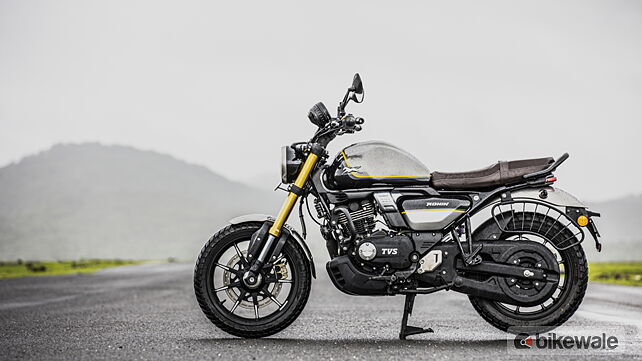












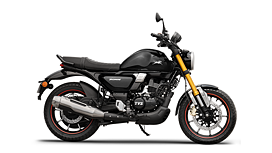

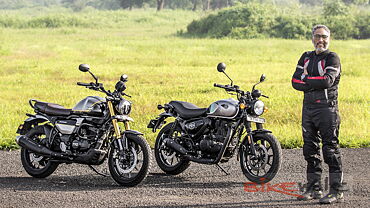
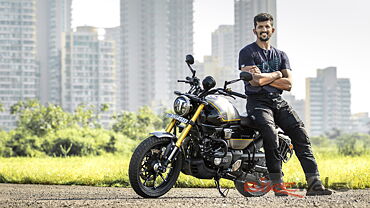


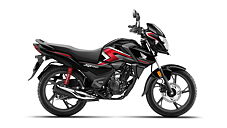
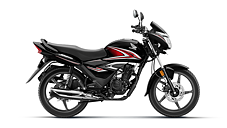

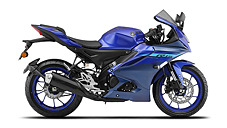
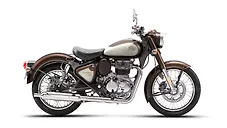
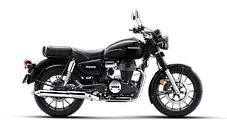
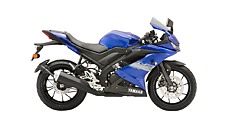
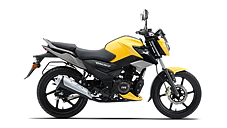
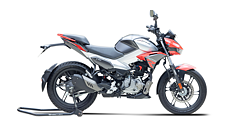
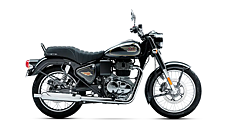
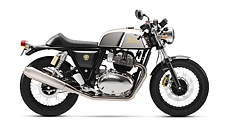
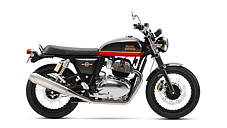
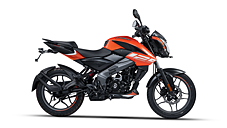

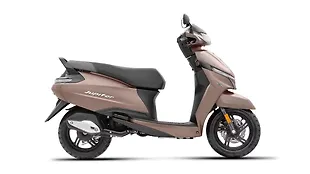
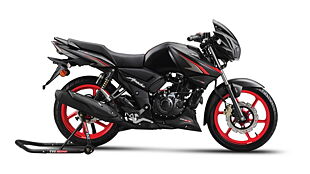




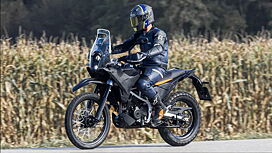
![KTM 390 Adventure X [2025] KTM 390 Adventure X [2025]](https://imgd.aeplcdn.com/272x153/n/cw/ec/190885/390-adventure-x-2025-right-side-view.jpeg?isig=0&q=80)